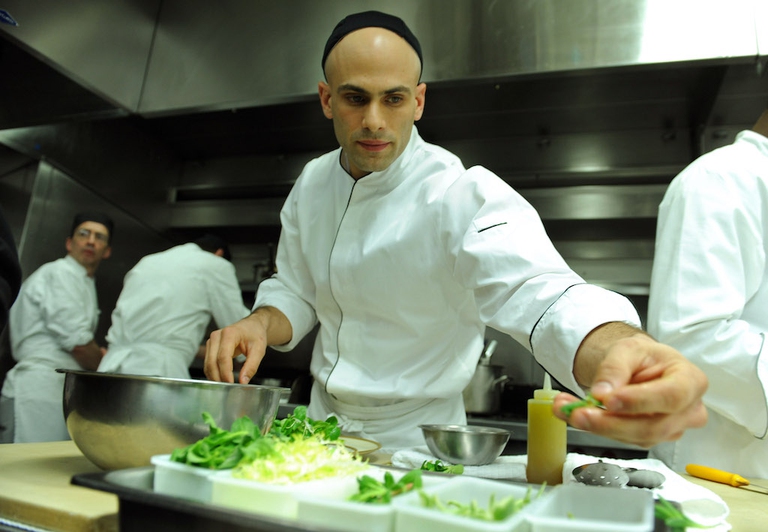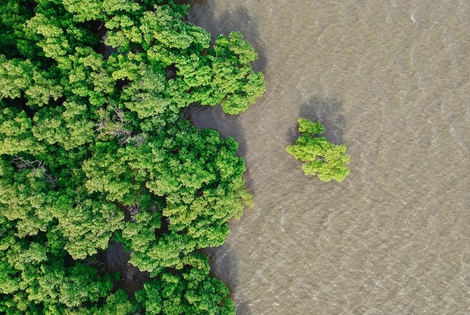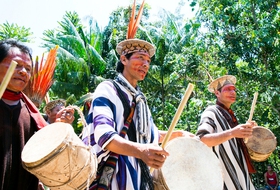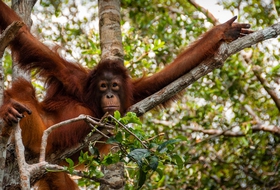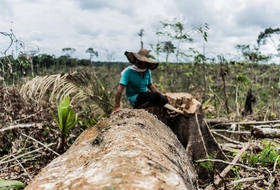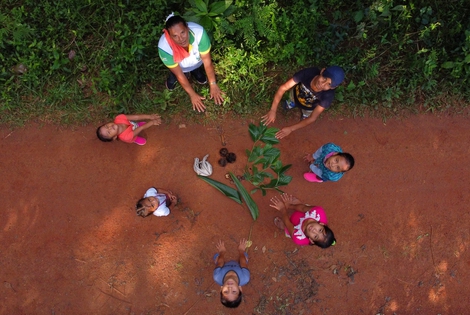
The Amazon became an alternative classroom during the pandemic. Now, the educational forest in Batraja, Bolivia, lives on to teach children and adults the value of nature.
Sam Kass has been close to the Obama family for over a decade, starting as their chef in 2005. His commitment to promoting healthy eating and a more sustainable food system – which causes fewer emissions and less deforestation, therefore contributing to climate change mitigation – has found a perfect fit with the former president’s and especially First Lady
Sam Kass has been close to the Obama family for over a decade, starting as their chef in 2005. His commitment to promoting healthy eating and a more sustainable food system – which causes fewer emissions and less deforestation, therefore contributing to climate change mitigation – has found a perfect fit with the former president’s and especially First Lady Michelle’s determination to set a new course for eating culture in the United States, where over a third of the adult population is obese. Two years into Obama’s term, in 2010, the country passed the Healthy, Hunger-Free Kids Act to improve school nutrition and fight childhood obesity through additional funding to schools serving whole grains, fruits, vegetables, low-fat milk products as well as less sodium and fat to their students. As White House chef and senior Policy Advisor for Nutrition, the first person to hold this post, Kass played a key role in the Obamas’ efforts to change the unhealthy and unsustainable eating habits of millions of Americans.
“With the work he has done to inspire families and children across this country to lead healthier lives, Sam has made a real difference for our next generation” (Barack Obama)
Some of Kass’ most remarkable achievements include having been executive director of Let’s Move!, a campaign to fight childhood obesity through healthy nutrition and an active lifestyle spearheaded by Michelle Obama. With her he also oversaw the creation of the first major White House organic fruits, vegetables and herbs orchard, known as the Kitchen Garden. Other of the chef’s White House successes include having led the creation of its first beehive and homebrewed beer.
As well as an expert on nutritional themes – leading him to appear in TV shows such as Chopped and currently as a senior food analyst at NBC News – Kass is an innovator. As an entrepreneur he is the founder of Trove, a collective of leaders and entrepreneurs working with corporations to transform health, the climate and planet through food, and as an investor he is a partner in Acre, a venture capital fund investing in the future of food. His experience in the field, and his personal relationship with the Obamas, made him the perfect candidate to sit down with the former president in his first international public appearance since the end of his term and interview him on the topics of nutrition and the climate at the Seeds&Chips Global Food Innovation Summit in Milan, Italy on the 9th of May. Here we met Kass to talk about what is needed to make the global food system more sustainable.
Barack Obama: “From constructing our Kitchen Garden to brewing our own Honey Brown Ale, Sam has left an indelible mark on the White House,” pic.twitter.com/BXUEfVFc6O
— Seeds&Chips (@SEEDSandCHIPS) April 3, 2017
What are the most promising innovations in terms of promoting healthy and nutritious food worldwide?
In terms of innovation and technology, using data to help farmers plant in a more efficient way so they need less fertilisers, have better seeds, need less water is going to be important to help do it in a way that’s sustainable for the land. Because we waste a lot and this has a huge environmental and economic impact. There are innovations around how we unlock the potential of the genetics within seeds. Not GMOs but gene editing, the ability to express different characteristics in a seed, which is going to make it possible to produce fruits and vegetables that have more nutrients, need less water, need no or very little pesticides. That’s the kind of innovation we’re going to need if we’re going to bring down the price of fruits and vegetables and grow them in an increasingly difficult climate to make sure that everybody, not just wealthy people, can afford healthy diets. When you look at what a sustainable food system looks like, it’s what a healthy food system in terms of personal health looks like. If we keep those visions together that’s when we can unlock the power.
What role do businesses and finance play in innovating the food system?
After spending six years in the White House I understand policy and the role of government, and government’s important. But in the end food is two things, it’s our culture, the deepest expression of who we are, and it’s a system of businesses. Farmers are business men and women, as well as people who drive food around, people who process it, chefs who cook it, every part is a private endeavour. If you want to change the system, it’s going to have to be changed by businesses. Governments can set incentives or nudge people one way or the other but in the end our culture drives what we produce and how we consume it. The companies that do the best job at that over the long term are going to outperform the ones who don’t: people need healthier food and the environment is starting to collapse so whoever is going to fix these problems is going to make the most money.
Speaking of policy, how will the election of Donald Trump affect your work with the Obama administration to get healthy food in schools?
There’s not going to be more progress, they’ve already done some things that were regrettable, rolling back some of the standards. It’s hard to understand why you’d do that seeing that almost every school in the US is following the law and parents want this. But in the end, most of what we did is intact and the train has left the station. I don’t think we’re going to make a lot of progress but we won’t go backwards too much either.
What actions can we as citizens take to help make the global food system more sustainable?
First and most important is to understand that the decisions we make about what we eat have a huge impact in terms of what people grow, how it’s manufactured, processed and consumed. Companies are desperately trying to figure out what we want and then trying to do that. We have a lot of power and we have to start tapping into that power to make somewhat better decisions. That means more fruits and vegetables, more plant-based foods, smarter, more sustainable proteins. If we do that little by little every day we can have a big impact.
So, in Kass’ vision, you don’t need to be the White House chef and a friend of the Obamas to influence the way food is grown and brought to our tables. It’s the daily choices that count combined with the effort of influencers like chef Kass to spread awareness – and love of good food.
Siamo anche su WhatsApp. Segui il canale ufficiale LifeGate per restare aggiornata, aggiornato sulle ultime notizie e sulle nostre attività.
![]()
Quest'opera è distribuita con Licenza Creative Commons Attribuzione - Non commerciale - Non opere derivate 4.0 Internazionale.
The Amazon became an alternative classroom during the pandemic. Now, the educational forest in Batraja, Bolivia, lives on to teach children and adults the value of nature.
Our species took its first steps in a world covered in trees. Today, forests offer us sustenance, shelter, and clean the air that we breathe.
Bangladesh suffered widespread damage as a result of Cyclone Amphan. Yet the Sundarbans mangrove forest acted as a natural barrier protecting the country from further destruction, as it has done countless times before.
On top of a 2.4 million dollar compensation, the indigenous Ashaninka people will receive an official apology from the companies who deforested their lands in the 1980s.
The tapir was reintroduced into Brazil’s Atlantic Forest, the country’s most at-risk ecosystem. The species can play a key role in the forest’s recovery.
Forests are home to 80 per cent of the world’s terrestrial biodiversity. This year’s International Day of Forests highlights the urgent changes needed to save them.
After a legal battle that lasted two years, Indonesia’s Supreme Court has revoked the permit to mine for coal in the forests of South Kalimantan in Borneo.
The list of human and animal victims of the Australia wildfires keeps growing – one species might already have gone extinct – as the smoke even reaches South America.
Areas where the FARC guerrilla used to hold power in Colombia have faced record deforestation. Farmers cut down trees, burn land and plant grass for cows. Because, “what else can we do for a living here in the Colombian Amazon”? An intimate report from the heart of the felled forest in Caquetá.
